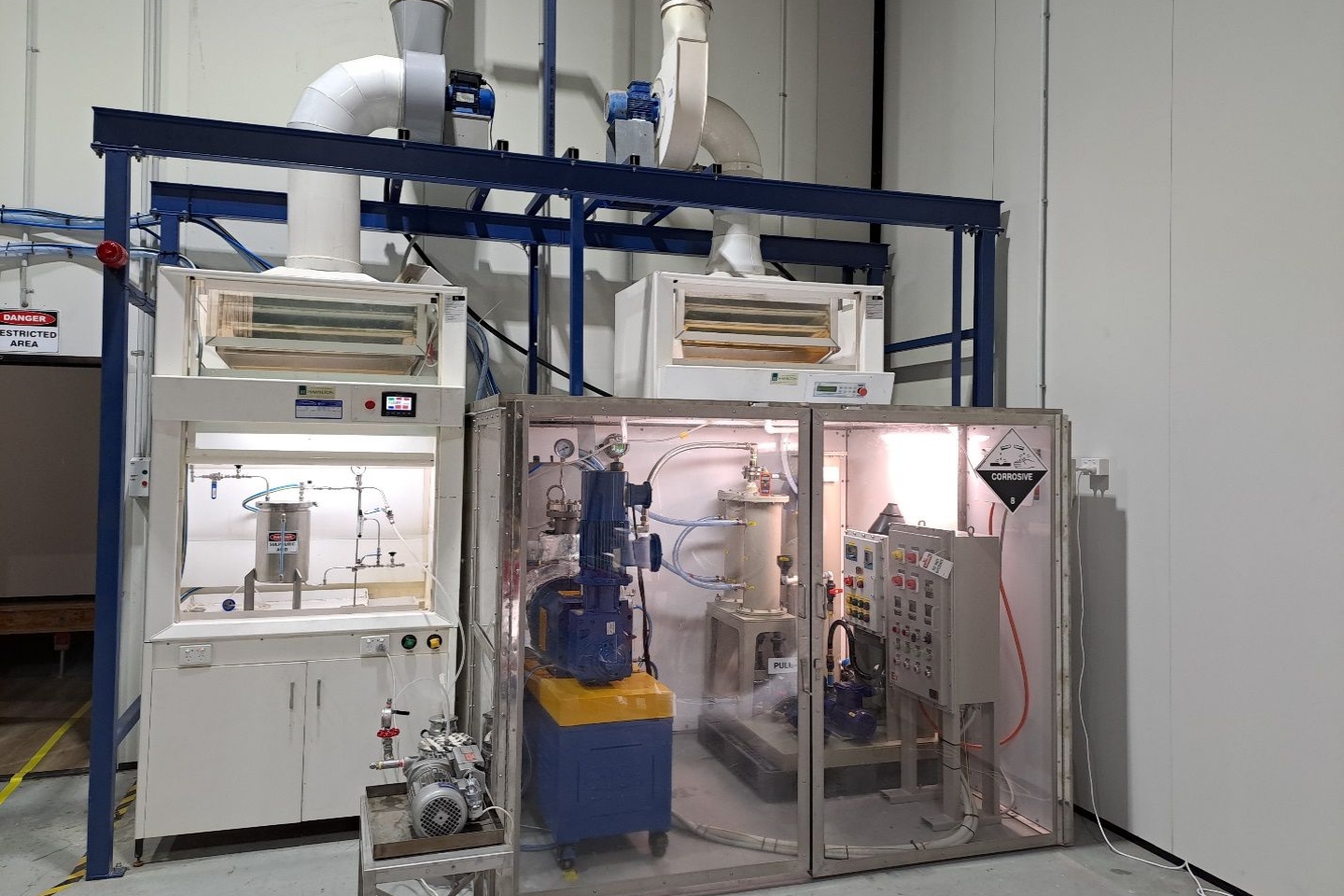ABx Group has launched the operation of its new pilot batch reactor in a world-first process to produce hydrogen fluoride from bath, a fluoride-rich waste product from aluminium smelting, at its technology centre in NSW. The company and its subsidiary, Alcore, believe the process they have developed could have great potential for Australia, which currently imports all of its aluminium fluoride.


ABx Group has launched the operation of its new, state-of-the-art pilot batch reactor in a world-first process to produce hydrogen fluoride from bath, a fluoride-rich waste product from aluminium smelting, at its technology centre in NSW.
The reactor was installed and commissioned in mid-September and the company and its 83 per cent-owned subsidiary, Alcore, believe the process they have developed could have great potential for Australia, which currently imports all of its aluminium fluoride. Management says the reactor’s technology enhances process mixing and has a process capacity 10 times that of the original laboratory reactor.
The new plant was designed by Alcore and ordered from a specialised international supplier in late March, with the expectation that if the pilot batch reactor achieves its designed high fluorine yield from aluminium smelter waste, it will provide further confidence that the continuous pilot plant and first commercial plant will perform as designed.
It would also enable further development of processing and market evaluation of potential metal sulphate co-products.
ABx managing director and chief executive officer Mark Cooksey said: “The commissioning of the reactor and subsequent production of hydrogen fluoride from excess bath is a great result for Alcore. Under modified initial conditions, the results provide the validation to proceed with further activities. Processing of bath using our new reactor will provide important data on our ability to produce greater yields than our smaller laboratory reactor, which will be used to eventually scale-up operations to a continuous pilot plant and first commercial plant.”
The typical smelting process produces several fluoride waste products, including per fluorocarbons and hydrogen fluoride as gases, in addition to sodium and aluminium fluorides and unused cryolite as particulates. The waste can be as little as 0.5kg per tonne of aluminium in the best plants and up to 4kg per tonne of aluminium in older designs from as far back as 1974.
Typically, a smelter generating a surplus of bath material will have to crush it to certain technical specifications and then bag it to reuse it in its process. The recovered fluorine is then used to produce hydrogen fluoride for use in a later-stage commercial plant process to produce aluminium fluoride – a high-value chemical essential for aluminium smelting.
An important consideration in the local context is that Australia is the world’s biggest aluminium smelting region but does not have local aluminium fluoride production. Australia imports most of its aluminium fluoride requirements from China and is the biggest purchaser of that country’s product.
Recent Alcore testwork indicates that achieving a high fluorine yield from aluminium smelter waste is feasible. But it is contingent on optimal process mixing, which proved difficult using Alcore’s original laboratory-scale reactor.
Yield is important. It refers to maximising the production of hydrogen fluoride and aluminium fluoride and minimising the amount of fluorine which reports to other metal sulphate co-products.
Alcore started its new reactor operation to process excess bath in a conservative ramp-up using modified conditions to provide greater safety and certainty that the reactor would perform as expected. Management says it is encouraged by the reactor’s first run, which demonstrated its performance and potential without issue and produced hydrogen fluoride.
In recognition of the inherent dangers associated with hydrogen fluoride, the company says it undertook a hazard and operability study to review its operational processes and safety protocols and to establish specific reactor temperature ranges, residence times and acid amounts. It says the next set of tests using standard process conditions have begun, with first results on reactor performance and bath process yield expected next month.
Following successful pilot batch trials, ABx and Alcore could find themselves on the cusp of designing and manufacturing a world-first, commercial-scale process that circumvents potentially difficult future market supply and antiquated processes of mechanically recovering, crushing and sizing excess bath to access its contained fluorine.
Is your ASX-listed company doing something interesting? Contact: matt.birney@businessnews.com.au












